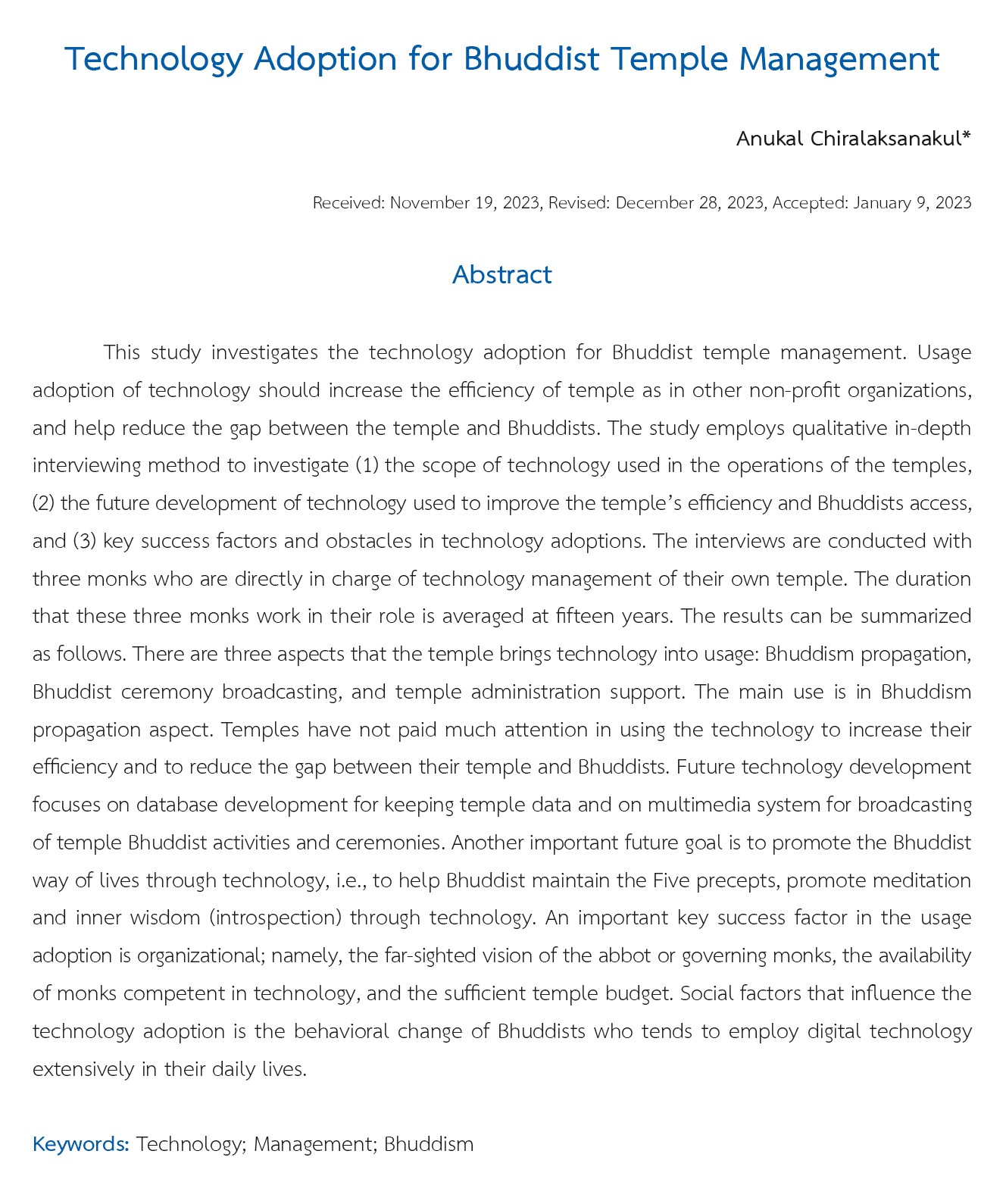Technology Adoption for Bhuddist Temple Management
Keywords:
Technology, Management, BhuddismAbstract
This study investigates the technology adoption for Bhuddist temple management. Usage adoption of technology should increase the efficiency of temple as in other non-profit organizations, and help reduce the gap between the temple and Bhuddists. The study employs qualitative in-depth interviewing method to investigate (1) the scope of technology used in the operations of the temples, (2) the future development of technology used to improve the temple’s efficiency and Bhuddists access, and (3) key success factors and obstacles in technology adoptions. The interviews are conducted with three monks who are directly in charge of technology management of their own temple. The duration that these three monks work in their role is averaged at fifteen years. The results can be summarized as follows. There are three aspects that the temple brings technology into usage: Bhuddism propagation, Bhuddist ceremony broadcasting, and temple administration support. The main use is in Bhuddism propagation aspect. Temples have not paid much attention in using the technology to increase their efficiency and to reduce the gap between their temple and Bhuddists. Future technology development focuses on database development for keeping temple data and on multimedia system for broadcasting of temple Bhuddist activities and ceremonies. Another important future goal is to promote the Bhuddist way of lives through technology, i.e., to help Bhuddist maintain the Five precepts, promote meditation and inner wisdom (introspection) through technology. An important key success factor in the usage adoption is organizational; namely, the far-sighted vision of the abbot or governing monks, the availability of monks competent in technology, and the sufficient temple budget. Social factors that influence the technology adoption is the behavioral change of Bhuddists who tends to employ digital technology extensively in their daily lives.
References
Anwar, M., Zaman Khan, S., & Ali Shah, S. (2020). A Study of the Relationship Between Innovation and Performance Among NPOs in Pakistan. Journal of Social Service Research, 46, 26 - 40.
Boles, B. (2019) Technology’s Role in the Nonprofit Sector: Increasing Organizational Effectiveness and Efficiency through Technology Innovations. Columbia Social Work Review, 11(1), 69–79.
Darin Jakrapan Intraudom. (2012). Propagation of Bhuddism of Thai Monks through New Media: The Case of Dhamma Today’s Website. Master’s Thesis. Graduate School, Chiangmai University.
Davis, F.D. (1989) Perceived Usefulness, Perceived Ease of Use and User Acceptance of Information Technology. MIS Quarterly. 13(3): 319-342.
Fishbein, M. and Ajzen, I. (1975) Beliefs, Attitude, Intention, and Behavior: An Introduction to Theory and Research, Reading, MA: Addison Wesley.
Laported, S., Kelly, D., and Agbabiaka, T., Can Technology Transform the Nonprofit Sector?, Yale Insights, insights.som.yale.edu, accessed in October 2018.
Lee, Younghwa; Kozar, Kenneth A.; and Larsen, Kai R.T. (2003) "The Technology Acceptance Model: Past, Present, and Future," Communications of the Association for Information Systems: Vol. 12 , Article 50.
Lu, J., Yu, C., Liu, C. and Yao, J.E. (2003), "Technology acceptance model for wireless Internet", Internet Research, Vol. 13 No. 3, pp. 206-222.
McNutt, John & Guo, Chao & Goldkind, Lauri & An, Seongho. (2018). Technology in Nonprofit Organizations and Voluntary Action. 10.1163/9789004378124.
Methee Chetwisut. (2019). Online Social Media and Bhuddism Propagation, Journal of Bhuddist Studies, 10(2), 521-531.
Pantita Srinitiworawong. (2019). Factors affecting technology transfer successfulness: a case study of electronic government procurement (e-GP) in Thailand, Master’s Thesis. College of Innovation, Thammasat University.
Pichet Tungto and Patrapol Jaiyen. (2020). Information Technology and Strategy for Bhuddism Propagation in the Online Era, Journal of Interdisciplinary Innovation Review, 3(1), 62-75.
Pinit Labthananon and Tanpan Senapan Buamai. (2014). Appropriate Bhuddist Monk Behavior for Internet Usage. Social Institute Research, Chulalongkorn University, Bangkok.
Population and Housing Census. (2014). National Statistical Office, Thailand, http://statbbi.nso.go.th/staticreport/page/sector/th/04.aspx, accessed in December 2024.
Provost Sangharakpittaya Yannatharo. (2018). A Study of Bhuddism Propagation in Thailand Digital Age. Master’s Thesis. Graduate School, Mahachulalongkornrajavidyalaya University.
Raman, A. (2016). How do social media, mobility, analytics and cloud computing impact nonprofit organizations? A pluralistic study of information and communication technologies in Indian context. Information Technology for Development, 22(3), 400-421.
Salido-Andres, N., Rey-Garcia, M., Álvarez-Gonzalez, L.I. & Vazquez-Casielles, R. (2019): Determinants of success of donation-based crowdfunding through digital platforms: The influence of offline factors, CIRIEC-España, Revista de Economía Pública, Social y Cooperativa, 95, 119-141, DOI: 10.7203/CIRIEC-E.95.13001.
Seidman, I. (2019) Interviewing as Qualitative Research: A Guide for Researchers in Education and the Social Sciences, 5th edition. Teachers College Press, New York.
Sid Suntrayuth. (2015). A Study of Non-profit Organization Management: The Link between Information Technology and Communication and Financial Survival of Organizations, NIDA Economic Review, 9(2), 54-86.
Somkiat Petchmak and Nujaree Boonket. (2017). The Use of Information Technology and Communications for Monk Community in Surin Province, Kasalongkham Research Journal, 11(3), 357-368.
Surasak Wisutjaro. (2017). Monastery Administration for Bhuddism Stability, Doctoral Dissertation, Graduate School, Mahachulalongkornrajavidyalaya University.
Yupaporn Aunkurawanich. (2007). Dhammakaya Temple and the Use of Modern Media for Dhamma Teaching. Bachelor’s Thesis, College of Religious Studies, Mahidol University.
Yingsak Nitisingha. (2018). The Need of Thai Monk for ICT in the Modern Age, Retrieved October 2, 2018, from http://phd.mbu.ac.th/index.php/2014-08-28-08-57-4/100-ict.
United Nations e-Government Survey, July 2018

Downloads
Published
How to Cite
Issue
Section
License
Copyright (c) 2023 NIDA Business School, National Institute of Development Administration

This work is licensed under a Creative Commons Attribution-NonCommercial-NoDerivatives 4.0 International License.



